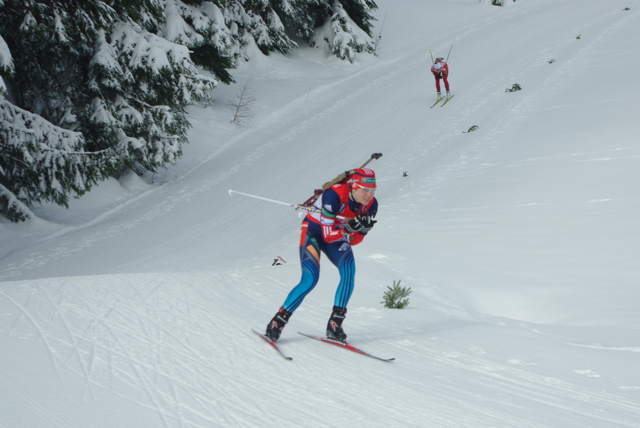
When Russian biathlete Alexander Loginov was provisionally suspended last week after a year-old sample tested positive for the blood-doping drug recombinant erythropoietin (EPO) using a new method, many weren’t surprised.
The question was, why does this keep happening to Russia? One interesting commentary by Evgeniy Slyusarenko of the Russian sports website Championat explained that in Western Europe and North America, the responsibility for performance lies on the athlete, who must make decisions for themselves and accept the consequences. On the other hand, in Russia, athletes are expected to follow orders – in fact, everyone is expected to follow the orders from their higher-ups. And it is not the bosses who get fired when there are doping scandals. The bosses only get fired when there are no Olympic medals.
A new documentary aired on German broadcaster ARD last night alleges that though the roots of the Russian doping problem are just as Slyusarenko described, it goes much deeper. Noted journalist and documentarian Hajo Seppelt found evidence of not only state-sponsored doping, but routine cover-up procedures in place to avoid scandals involving high-profile athletes. Unknown and up-and-coming athletes were not so lucky, and were discarded by the system after a positive test.
You can find the hour-long documentary here, if you have VPN or a location-unblocker, and if you understand German.
Seppelt was compelled to investigate Russian doping after the 2014 Olympics, in part after it was revealed that Russian cross-country skiers were using xenon gas as a performance-enhancing measure.
“I wanted to report to a much greater degree on doping in Russia,” Seppelt told ARD in an interview. “Research in March. I could not expect at the time that the story would evolve like this. We must assume that in Russia a state-supported doping system exists with a big cover-up machine that pulls the strings in the background.”
Many of the central messages in the documentary come via a pair of whistleblowers who contacted Seppelt: 800-meter runner Yuliya (Rusanova) Stepanova, and her husband Vitaliy Stepanov, who used to work for the Russian anti-doping agency RUSADA.
The pair claim that not only would officials cover up positive tests by star athletes, for instance by “making a mistake” in the labwork to justify throwing out the results, but that athletes were also told to keep “clean” urine samples in their freezers to use for doping tests.
The documentary also shows a video clip recorded on a cell phone, in which London 2012 800 meter gold medalist Mariya Savinova admits to using oxandrolone, a prohibited anabolic steroid.
Several other athletes went on the record about not only doping and the availability of illicit performance-enhancing drugs, but also shady financial practices used by Russian federations, sometimes through shell companies.
Some of the allegations have also been reported on by other journalists. For instance, it was French newspaper L’Equipe which initially wrote that Russian marathon champion Liliya Shobukhova had paid her own federation a bribe to avoid a doping ban. After paying, she raced in the 2012 Olympic marathon – but when she failed to finish, the federation banned her after all.
Multiple Russian sports and anti-doping officials have categorically denied the claims.
“You should be very careful about putting too much faith into these athletes’ claims,” the head of Moscow’s doping control lab, Grigory Rodchenkov, said according to The Guardian. “These people are experiencing the biggest catastrophe of their lives.”
Seppelt disagrees.
“I did not think that there was still any system, in 2014, which has so many parallels to what was formerly done in East Germany,” he said in his ARD interview. “All this is topped by the capitalist characteristics of a commercialized elite sport system that is the status quo in Russia.”
And as for why no Russian athletes tested positive in Sochi? That’s no accident, he concludes.
“The facade has little to do with the reality of the thing,” he said. “In our film, you will see that both the Russian Anti-Doping Agency, the Doping Control Laboratory in Moscow, and sporting organizations operate what is obviously a system for the protection of national interests and the cover-up of doping to a significant extent… in my view it’s just window dressing.”
Alex Kochon
Alex Kochon (alexkochon@gmail.com) is a former FasterSkier editor and roving reporter who never really lost touch with the nordic scene. A freelance writer, editor, and outdoor-loving mom of two, she lives in northeastern New York and enjoys adventuring in the Adirondacks. She shares her passion for sports and recreation as the co-founder of "Ride On! Mountain Bike Trail Guide" and a sales and content contributor at Curated.com. When she's not skiing or chasing her kids around, Alex assists authors as a production and marketing coordinator for iPub Global Connection.




2 comments
T.Eastman
December 4, 2014 at 11:42 am
Marathon runners pay big rupals: http://www.washingtonpost.com/blogs/early-lead/wp/2014/12/03/chicago-and-london-marathon-winner-reportedly-paid-russian-officials-550000-to-keep-her-doping-secret/?commentID=washingtonpost.com/ECHO/item/1417678201-641-421
teamepokeedsbyn
December 4, 2014 at 12:18 pm
Mr. Eastman, good link.
Interesting that she had an extra $500k to burn for bribes (more than even Lance paid), as dont think top runners can expect 10’s of millions $’s earnings in a career, and even more amazing is they gave her a “refund” when she got caught! I wonder what lowly rusky x-c skiers could/have afforded for bribes. Man, non-dopers had few chance’s in the 1980’s and ’90’s it seems, given if this is happening today, and what we have learned about Finn, Italian, Austrian, etc. programs in the past.